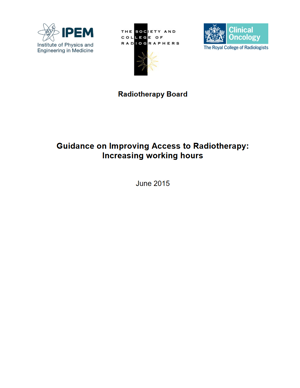Guidance on Improving Access to Radiotherapy: Increasing working hours
Date: 2015
Radiotherapy is a highly effective treatment and contributes to the cure of 50% of patients with cancer. It can be used alone or in combination with surgery and systemic therapy (chemotherapy, hormone or biological therapy). Radiotherapy is also an effective palliative
treatment in patients who have symptoms owing to the local effects of their cancer.
Radiotherapy aims to eradicate tumour cells and minimize the effect of radiation on the surrounding tissue; therefore each patient’s radiotherapy requires individual planning, preparation and delivery. Depending on the type and site of the tumour, patients could attend for just one single treatment or up to thirty seven daily treatments. Traditionally the normal working hours for radiotherapy services have been Monday to Friday, 9am to 5pm. As the requirement for additional capacity to treat more patients with more complex treatments continues to increase, this working pattern is being challenged.
It is anticipated that this need for additional capacity will continue. The incidence of cancer is predicted to increase by around 2% per annum over the next 10 years 1 with a consequent increase in the radiotherapy workload. Survival rates for patients with cancer in the UK still lag behind Europe and the rest of the developed world. 2 To address this, plans are in place to expand cancer screening. 3 These aggressive public health campaigns and screening programmes will facilitate earlier diagnosis of cancer. This will increase the number of patients receiving radiotherapy with the aim of cure which in turn increases the number of fractions of radiotherapy required, as patients receiving curative (also known as radical) radiotherapy are usually treated with daily radiotherapy over weeks, rather than the shorter courses of treatment currently used for palliation.
